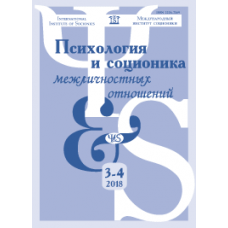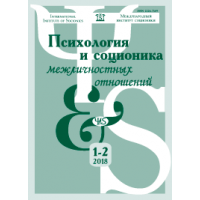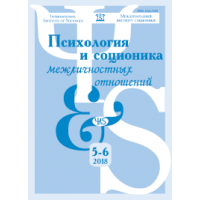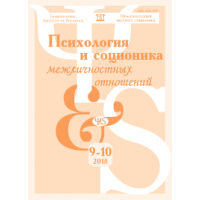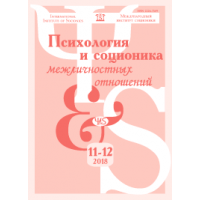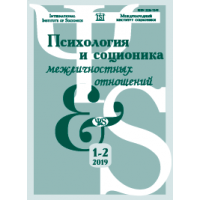Номер № 3-4/2018 журналу «Психологія та соціоніка міжособових відношень»
Дослідження
Мартьянова А.Л.
Аналіз інтегрального типу колективу на прикладі сім'ї
Проводиться аналіз взаємовідносин між членами колективу на прикладі сім'ї. Розглядаються способи покращення психологічної атмосфери в ньому та компенсації некомфортних інтертипних відносин, а також оптимального виховання дітей на основі визначення та практичного аналізу інтегрального типу колективу, використовуючи об'єднавчий підхід інтровертної соціоніки В.В. Гуленка та інші соціонічні методи. em>Ключові слова: соціоніка, тип інформаційного метаболізму (ТИМ), модель А, інтертипні відносини, інтегральний тип колективу, сильні функції, стимули до діяльності, види колективів, комфортність відносин.
Практична соціоніка
Московських Н.І. Спостереження з практики: різниця між підходами ЕСІ та СЕЕ до людей
Стаття присвячена розгляду внутрішньої динаміки типів ЕСІ та СЕЕ, спостереження за представниками соціонічних типів з сильною "етикою відносин" (R) у блоці ЕГО в рамках Гамма-квадри та розгляду різниці у підході до людей у носіїв базової та творчої «етики відносин» в Гамма-квадрі. соціонікам-практикам, які вивчають питання діагностики типу та/або самотипування, що стикаються з типологічними закономірностями прояву «етики відносин» em> соціоніка, біла етика, суб'єктивна етика, етика відносин, чорна сенсорика, вольова сенсорика, силова сенсорика, внутрішня динаміка типу, тип інформаційного метаболізму, сенсорно-етичний екстраверт, етико-сенсорний інтроверт, Гамма-квадра, квадрові цінності, цінності третьої квадри.
Методи соціоніки
Букалов А.В.
Про залежність суб'єктивного сприйняття партнера та інтертипних відносин від мотиваційної установки
Описана залежність оцінки партнера з комунікації від мотиваційної установки людини. активатору суб'єкта, що сприймає. Це пов'язано з виділенням і мотиваційною селекцією свідомістю суб'єкта специфічної інформації про партнера, що надходить по 5-й і 6-й функцій - блоку СуперІд. тип конфліктера чи підревного. суб'єкта, що сприймає, виділяє та селектує інформацію щодо 3-ї та 4-ї функцій - блоку СуперЕГО.
Ключові слова: соціоніка, психологія, мотиваційна установка, інтертипні відносини, міжособистісні відносини, суб'єктивне сприйняття .< /p>
Математичні методи в соціоніці
Мінаєв Ю.П., Даценко І.П., Пінда М.В.
Формули малих груп у «признакових» моделях інтертипних відносин
Ця стаття є одинадцятою в задуманій серії публікацій, присвячених організації занять зі студентами, на яких вони знайомитимуться з математичним апаратом соціоніки. піде про дві «ознакові» моделі інтертипних відносин, безпосередньо пов'язані з двома групами біполярних ознак типів інформаційного метаболізму. інтертипних відносин та відповідними 3 елементними множинами взаємозалежних біполярних ознак типів, що потрапили в одну четвірку при заданій тетрахотомії соціону. моделі (за Аугустинавічюте).
Ключові слова: соціоніка, класична модель інтертипних відносин, «ознакові» ), Юнга-Мінаєва ознаки (ЮМПи).
Інтертипні відносини
Нехорошева В.В.
Напівдуальні відносини на прикладі ЛСІ та ЕСЕ
Стаття присвячена розбору напівдуальних відносин на прикладі ЛСІ (LF) — class="soc">ES) Наводяться приклади взаємодії резонансів за функціями моделей А.
Ключові слова: соціоніка, тип інформаційного метаболізму (ТИМ), модель А, сильні функції , інтертипні відносини, напівдуальність, ЛСІ, ЕСЕ.
Соціонічні портрети
Еслюк Р.П.
Психологічні типи в біографіях: майстер утилізації Мілтон Еріксон
Проаналізовано соціонічний тип відомого психотерапевта Мілтона Еріксона, з позицій соціоніки описана специфіка його професійної діяльності, яка виявила велике вплив на розвиток психотерапії та психології. психології, що охоплює прикладні (типування відомих психологів) і теоретичні аспекти побудови загальної теорії.
Ключові слова: слова: визначення соціонічного типу, соціонічні психобіографії, Мілтон Еріксон інтегральна теорія психології.
Психологія особистості
Чернишова О.І.
Інтерпретації багатокомпонентних типологій з позиції его станів Е. Берна на прикладі соціоніки та типології А. Афанасьєва
Розглядаються інтерпретації багатокомпонентних типологій з позицій его станів Е. Берна. Вводиться новий Его-стан структурного аналізу, який дозволяє простежити внутрішню динаміку соціонічних і психософських типів і знайти розв'язання проблем, що виникають у носіїв типів. , ТИМ, встановлення особистості, комплементарність, дуальність, агапі, функція, аспекти функцій, внутрішня динаміка типів, самість, близькість, самоактуалізація.
Наприкінці номера
Циганкова А.А., Гузенко С.В.
Математичні фокуси з картами< /h4>
Показано логічний ланцюжок дій, при використанні карт у деяких фокусах, якими так захоплюються любителі всього цікавого і незрозумілого. Докладно описані правила рахунку та вказані математичні закономірності, які допомагають повірити фокуснику. гральні карти, математична логіка.
Психологія та соціоніка 3-4/2018
- Модель: выпуск журнала «Психология и соционика…»
-
$3.00
- Ціна в бонусних бали: 30
Рекомендовані товари
Психологія та соціоніка 1-2/2018
Номер № 1-2/2018 журналу «Психологія та соціоніка міжособових відношень» Психологія особ..
$3.00
Психологія та соціоніка 5-6/2018
Номер № 5-6/2018 журналу «Психологія та соціоніка міжособових відношень» Класика Єрмак В..
$3.00
Психологія та соціоніка 7-8/2018
Номер № 7-8/2018 журналу «Психологія та соціоніка міжособових відношень» Методи соціонік..
$3.00
Психологія та соціоніка 9-10/2018
Номер № 9-10/2018 журналу «Психологія та соціоніка міжособових відношень» Практична соці..
$3.00
Психологія та соціоніка 11-12/2018
Номер № 11-12/2018 журналу «Психологія та соціоніка міжособових відношень» Дослідження Н..
$3.00
Психологія та соціоніка 1-2/2019
Номер № 1-2/2019 журналу «Психологія та соціоніка міжособових відношень» Психологія та ф..
$3.00

